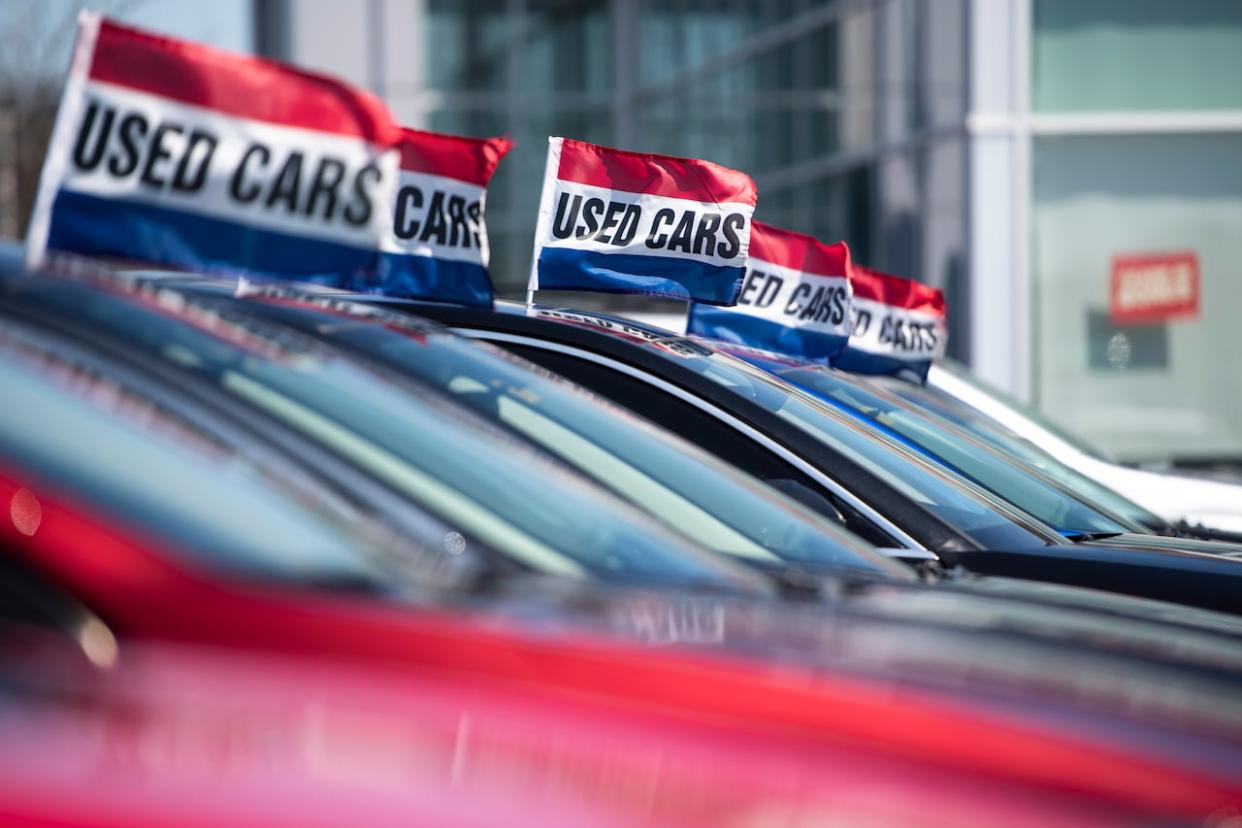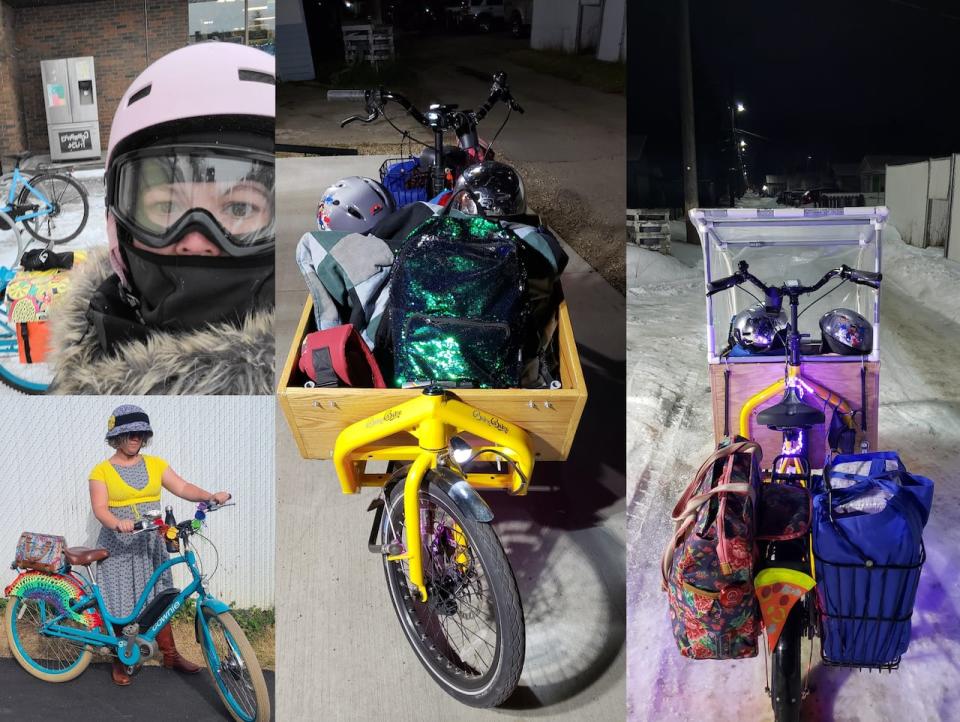'This just feels like a weird, bad moment to buy': How Albertans cope with highest new car prices in Canada

The cost of just about everything is up these days, but vehicles — both new and used — are selling at prices that would have been considered absurd a few years ago.
There's been all sorts of news about the reasons behind this, which include supply chain issues, microchip shortages and pent-up demand.
But where does all this leave the average person? Especially the average person in Alberta?
Prices are higher here than in any other province, according to a recent report. So how are folks coping?
Some are putting off car purchases as long as they can, opting instead to sink big money into repairing the older vehicles they already own. Others are looking overseas, importing right-hand-drive vehicles from countries like Japan. Others, still, are simply downsizing from two vehicles to one. Or one to none. And the recent growth in other options — like electric bicycles — has made that transition easier.
If it's been a few years since you've had to buy a car, you might not have realized just what it's like out there these days. If you've made a recent purchase, you likely know the struggle.
Sticker shock
The average new vehicle in Alberta sold for $70,771 in September, according to the AutoTrader Q3 Price Index, which was up more than 15 per cent year-over-year.
Used vehicles, meanwhile, averaged $42,051, up more than three per cent.
At the same time, the number of registered vehicles in the province has declined — even while the number of licensed drivers has grown.
In both Edmonton and Calgary, there are now fewer vehicles than drivers, which is a relatively new development for both cities.
This downward trend began before the pandemic and all the supply-chain issues, but the recent price surge has likely played a role, as well.
Even outside the major cities, the number of vehicles per driver has dipped in the past couple of years.
Numerous Albertans who spoke with CBC News over the past week say the sheer cost of vehicles has prompted them to think twice about buying additional vehicles — or getting rid of the ones they already have.
Others are simply trying to hold on to the ones of they've got until the market changes.
The price is right to repair
Paul Turnbull's 10-year-old Subaru Outback has seen better days.
In the spring, he and his partner had to sink $4,000 into some major maintenance. Then in the summer, the engine failed, and they were looking at another $9,000 in repairs.
At that point, you might think it would make more sense to simply give up and buy a different vehicle. But not today. Not in this market.
Turnbull says they put all the numbers into a spreadsheet and, given the cost of buying a new car, they figured it actually made more sense to repair their old Outback.

Paul Turnbull speaks to CBC News via online video chat about his decision to repair his old car rather than buy a new one. (Google Meet/Screenshot)
"We were fortunate in that we had the ability to drop nine grand immediately," he said. "Like we didn't have to pull debt to do that, which I think definitely influenced the decision."
They ended up cancelling a planned trip to Ireland as a result of the unexpected repair bill, and having to go without a car at all for three months while they waited for parts.
But in spite of all that, Turnbull says it was still a better option, for them, compared to buying a new vehicle in the current market.
He hopes to keep the Outback for a while longer and make his next purchase an electric vehicle.
A kid in a coupe?
Brendan Brown is putting off a car purchase, as well.
His Volkswagen GTI is working just fine, and he loves driving the manual-transmission two-door car.
The only problem is: he and his wife are hoping to have a baby soon.
They don't love the idea of getting a kid in and out of a car seat in a two-door vehicle but, given what the car market is like these days, he's not ruling it out.
"When they're tiny, and we want to be at home for a while, how long can we just get away with this two-door GTI?" he said of his thought process.
"You know, we're supposed to not get any sleep for like four months or something, right? We'll be at home. So it'll be fine. Maybe we can kick that can four months further down the road."

Brendan Brown speaks to CBC News via online video chat about why he's putting off buying a new car. (Google Meet/Screenshot)
The alternative of wading into the car market, whether new or used, is something he's "dreading."
"This just feels like a weird, bad moment to buy," Brown said.
"If you're enjoying the car you're in … you cross your fingers every time you start it. It's like, 'please do not give me a world-ending problem or have the engine fall out.' … So I'm just like, 'Let's just sort of put this off and, you know, hopefully it'll get better later.'"
Looking (really) far and wide
Mark Senior was in the position of needing to buy a new-to-him vehicle but wasn't finding anything decent that was also affordable.
"We'd gone to some lots and looked at cars that were in our price range," he said. "And like, you know, you sit in the thing and it smells of cigarette smoke and it makes some funny noises when you drive it. So, not great."
Eventually he heard about another option: importing a vehicle from overseas.
A colleague had done it, bringing a used vehicle from Japan to Alberta, and told him the process wasn't as hard as you might think.
"The paperwork requirements of keeping older cars on the road in Japan, even if they're in very good condition, are pretty onerous," Senior said. "And so there's not much market there for older cars. So they're a major exporter."
He found a used Honda Fit for sale in Japan with only 50,000 kilometres on it that looked to be in good condition.
He said the purchase price for the vehicle was only $1,000 but then it cost about $6,000 to get it to Vancouver and another $1,000 to get it to Edmonton, where he lives. Then an out-of-province inspection turned up about $1,000 in maintenance that needed to be done before it could be registered in Alberta.
That put the all-in cost below $10,000, which he said was cheaper than anything he could find locally with double or triple the mileage.
Of course, it's a right-hand-drive vehicle, which he said takes some getting used to.
Going car-free
Kelly Granigan has taken things a step further: getting rid of her household vehicles altogether.
A decade ago, she and her husband lived in suburban Edmonton and owned a Dodge Ram Laramie pickup truck and a Toyota Matrix.
Today, they live in the inner city with their two kids and have since sold both vehicles, replacing them with electric bikes.
"After we had the kids, we decided to go car-free," she said.
She knows this isn't typical but says it's the right setup for them. Cost was a big factor in their decision, but she says she and her family also prefer riding their fleet of bicycles — including an electric cargo bike — to driving, year-round.
"I know it's hard to picture," she said.
"Everyone's like, 'Oh, you can't get groceries in a cargo bike.' And I'm like, 'Here's a picture of me getting groceries on a cargo bike.' We have pictures of my husband doing a Costco run with two kids on the back of his bike. It's our normal."

Kelly Granigan and the various bicycles that have replaced her car and truck. (Submitted by Kelly Granigan)
The cost savings have been enormous, Granigan said, enabling them to afford the house they now live in.
"We used to have like a $350,000 house in the suburbs, and now we have a $600,000 house in the middle of the city," she said.
"We save more money by not having a car. It's actually cheaper to have the twice-as-pricey house and no cars than two cars with the half-price house."
For folks who aren't quite ready to abandon their cars altogether, there may be a little hope on the horizon.
Car prices have (probably) peaked
Prices for new cars "have probably peaked," said Baris Akyurek, vice-president of insights and intelligence with AutoTrader in Canada.
Since putting out their Q3 report for September, he said prices have declined in both October and November — not by much, but enough to suggest the tide is likely turning.
In Alberta, specifically, he said the average price for a new vehicle in the province had fallen ever so slightly to $70,019 in November.
On the used side, he said there have been month-over-month price declines since July.
The trend has been seen across Canada, including in Alberta. The average for a used vehicle in the province had edged down to $41,141 in November.
Akyurek said there is often a price spike for used vehicles early in a new year, but even if that happens in January and February, he expects prices to start declining again later in 2024.

